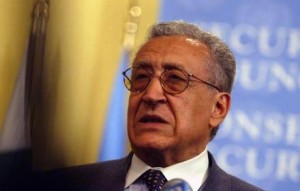 GENEVA (AP) -- After a rocky day of U.N.-brokered talks, the United States and Russia failed to agree on a date to bring Syria's warring sides back to the negotiating table, and the two powers remained divided Tuesday over what role Iran should play in a hoped-for Geneva peace conference.
GENEVA (AP) -- After a rocky day of U.N.-brokered talks, the United States and Russia failed to agree on a date to bring Syria's warring sides back to the negotiating table, and the two powers remained divided Tuesday over what role Iran should play in a hoped-for Geneva peace conference.The U.N.-Arab League's top envoy to Syria, Lakhdar Brahimi, told reporters at the end of the talks involving the U.S., Russia and other nations that the impasse did not mean all hopes of resuming negotiations from June 2012 were dashed. Another round of U.S.-Russian talks on arranging a second peace conference in this city is planned for Nov. 25.
"We are still striving to see if we can have the conference before the end of the year," he said.
Brahimi said one of the biggest hurdles is various divisions among the Syrian opposition. "It is no secret to anyone that the opposition has a lot of problems and is working seriously to overcome these problems to reach a position and to appoint a convincing delegation to represent them in Geneva, and that is what has delayed us a bit," he said.
The diplomatic talks among world powers in Geneva at the U.N.'s elegant Palais des Nations contrasted sharply with the heavy shelling and missile attacks being waged in a civil war that both sides still believe they might win on the battlefield.
Diplomats ran into repeated roadblocks Tuesday. World powers strongly disagreed over what diplomatic steps to take to resolve the fighting and what any future Syrian leadership beyond President Bashar Assad's government should look like.
Syria's information minister, Omran al-Zoubi, said the Assad government is not ready to negotiate handing over power. Syrian opposition leaders have insisted that Assad be excluded from Syria's future leadership for any talks to take place.
Russian Foreign Minister Sergei Lavrov, whose nation has staunchly backed Assad, again insisted that fellow Assad supporter Iran be part of any talks on ending the Syrian conflict. But Iran's proposed presence at a Geneva conference would be an irksome factor for Syrian rebels and their Gulf Arab backers.
Normally chilly relations between Washington and Tehran have slightly thawed in recent months due to increased Iranian cooperation in talks on its nuclear program. But a senior U.S. official, who was not authorized to go on the record and spoke on condition of anonymity, said Washington remains opposed to Iran's participation in a Geneva conference on Syria.
That's mainly due to Iran's lack of backing for the principles agreed upon at the first Geneva peace conference on Syria in June 2012, which the official said all nations that participate in Syria discussions should support. The official added that the U.S. has "some great concerns about Iran's participation in the (Syrian) conflict and Iran's financing of Lebanese Hezbollah."
The United Nations, meanwhile, announced that as many as 40 percent of Syrians are now in need of outside aid in the form of food, shelter, medicine and other basic supplies that are running short due to the conflict.
The Syrian war has left more than 9 million people in need of humanitarian assistance, including 6.5 million who are now internally displaced, said Jens Laerke, a spokesman for the U.N. Office for the Coordination of Humanitarian Affairs. The death toll in the civil war officially surpassed 100,000 more than three months ago.
"It's a disaster, and it continues," Laerke said.
In Syria, a mortar round Tuesday slammed into a Damascus building that houses the Vatican's embassy. No casualties were reported and no one claimed responsibility for the attack.
Tuesday's meetings aimed at paving the way for a second peace conference first brought together Brahimi and Jeff Feltman, the U.N.'s undersecretary-general for political affairs, with senior Russian and U.S. officials.
The circle expanded for a second meeting with three permanent members of the U.N.'s 15-nation Security Council - Britain, France, China. By late afternoon, it expanded again to include Syrian neighbors Turkey, Lebanon, Jordan and Iraq, which are struggling to cope with massive influxes of Syrian refugees, and the Red Cross and U.N. humanitarian agencies.
The roadmap for a Syrian political transition adopted in June 2012 in Geneva starts with establishing a transitional governing body with full executive powers agreed to by both sides and ends with elections. But there has been no general agreement on how to implement it, and perhaps the biggest sticking point remains Assad's future role.
By The Associated Press
The Iran Project is not responsible for the content of quoted articles.










